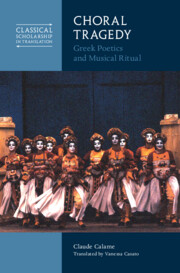Book contents
- Choral Tragedy
- Classical Scholarship in Translation
- Choral Tragedy
- Copyright page
- Dedication
- Contents
- Foreword
- Preface to the English Edition
- Note on the Translations
- Methodological Prelude
- Chapter 1 The Essence of ‘The Tragic’
- Chapter 2 Tragedy, Cult and Ritual
- Chapter 3 Choral Polyphonies and Tragedy
- Chapter 4 Aeschylus’ Persians
- Chapter 5 Euripides’ Hippolytus
- Chapter 6 Sophocles’ Oedipus Tyrannus
- Chapter 7 Poets, Tragic Diction and Tragic Fiction
- Bibliography
- Index of Names
- Subject Index
Chapter 1 - The Essence of ‘The Tragic’
Published online by Cambridge University Press: 25 April 2024
- Choral Tragedy
- Classical Scholarship in Translation
- Choral Tragedy
- Copyright page
- Dedication
- Contents
- Foreword
- Preface to the English Edition
- Note on the Translations
- Methodological Prelude
- Chapter 1 The Essence of ‘The Tragic’
- Chapter 2 Tragedy, Cult and Ritual
- Chapter 3 Choral Polyphonies and Tragedy
- Chapter 4 Aeschylus’ Persians
- Chapter 5 Euripides’ Hippolytus
- Chapter 6 Sophocles’ Oedipus Tyrannus
- Chapter 7 Poets, Tragic Diction and Tragic Fiction
- Bibliography
- Index of Names
- Subject Index
Summary
Though he was both friend and collaborator of Johann Wolfgang Goethe in Weimar, Schiller was not significantly influenced by his fellow playwright. We find no allusion in his quasi-Aristotelian definition of ‘Tragedy’ to the famous triad canonized some thirty years later by the master of Weimar: Epos, Lyrik, Drama – the ‘three natural and authentic forms of poetry’. Admittedly, Goethe was at pains to nuance his thesis precisely in relation to ‘das ältere griechische Trauerspiel’, ‘the ancient Greek tragedy’. He explained that in a first phase of development of the genre the three natural forms of poetry merged into one, inasmuch as the main character was still the chorus and the lyric mode was predominant. Later, the three forms tended to diverge and to organize themselves in sequence within individual tragedies. Goethe therefore found within the genre of tragedy the clarity of narrative epic, the exaltation of lyric emotion and the personal action of drama.
To get to the root of the grave misunderstanding underlying modern notions of the lyric mode we must revisit this chapter in the history of tragic criticism.
- Type
- Chapter
- Information
- Choral TragedyGreek Poetics and Musical Ritual, pp. 1 - 20Publisher: Cambridge University PressPrint publication year: 2024

